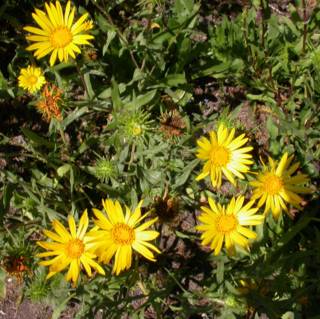Grindelia
From Wikiwel
Other names : Gumweed, August Flower, Grindelia, Grindelia camporum, Grindelia Herb, Grindelia robusta, Grindelia squarrosa, Grindeliae Herba, Gum Weed, Gumweed Herb, Rosin Weed, Tar Weed. The active compounds in grindelia include resins; flavanoids such as kumatakenin and acacetin; and diterpenes of the grindelane type.
Special Precautions of Grindelia
- If taken in large doses, it may produce irritation in the stomach or kidney.
- It can cause some side effects such as stomach upset and diarrhea.
- Do not use gumweed if you are pregnant or breast-feeding.
- Do not use gumweed if you are allergic to ragweed, marigolds, daisies, and other related plants.
- For purposes of internal usage, grindelia should be consumed under the direction and supervision of a qualified health care provider.
The benefits of Grindelia are
- Grindelia has a calming effect on the heart muscles, which makes it effective in the natural treatment of asthma and bronchial conditions, particularly when these are linked with an increase in the rate at which the heart beats and nervous response.
- It is also used an herbal remedy for whooping cough and respiratory catarrh. Grindelia is a potent expectorant, which helps clear up severe congestion that occurs in the case of chronic bronchitis, asthma and emphysema.
- In addition, it is used as an antispasmodic and a urinary tract disinfectant.
- Grindelia has also been used for a long time as a remedy for dermatitis caused by poison oak or poison ivy. The latter belong to the genus of Toxicodendron and contain a strong resin, urushiol, which causes a severe allergic reaction in case of contact with skin. The plant was used for this purpose by the Native Americans and also in pharmaceutical medications in the early 1900’s. Application of the tincture on the affected area will provide relief.
- Topical preparation of grindelia can also be used to soothe burns, insect bites and skin rashes.
